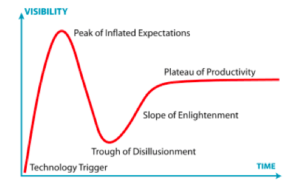![[Walkerch]_hr copy](https://www.artificiallawyer.com/wp-content/uploads/2017/03/Walkerch_hr-copy-678x381.jpg)
Artificial Lawyer recently caught up with Eversheds Sutherland partner, Charlotte Walker-Osborn, who is the firm’s UK head of TMT and an adviser to AI companies. We discussed what issues AI companies need to think about, especially when they are starting, what challenges AI companies in general are facing and what is the global law firm’s own approach to the use of legal AI.
First, it’s great to see a partner in a major law firm such as Eversheds Sutherland developing a practice that involves AI. In terms of the types of AI clients you advise, what are the key legal issues they are facing?
Many countries are currently catching up with the need for changing their laws as a result of the changing risk profile, and social and other impacts that result from the use of AI and robots.
This means, whether you are supplying AI or procuring AI, it is very important to think through how the law might apply to AI now and/or how liability might be apportioned if things go wrong.
This is equally the case whether AI is being used in back office systems or in robots, or in your own customer-facing solutions, or your own creation of documents, such as legal documents.
Some key points include:
Pilot Contracts
In part, this depends on whether the AI company is a supplier of AI or a potential customer wishing to utilise AI within their business. In either case, a lot of time is being spent by companies investing in ensuring AI is fit for the customer’s potential use case or proving the concept for its use.
We are therefore seeing a number of pilot or evaluation contracts being put in place. Often this is resulting in contracts needing a phased approach to adoption or being akin to an ‘agile’ type of contract.
IP
Perhaps one of the key issues both customers and suppliers are grappling with is intellectual property ownership.
Even if you just consider the UK, copyright law seems to envisage there might always be human intervention in creation, which arguably is not always the case, making ownership far from clear cut. If your company uses AI to do legal work, it will be really important to know who owns the IP in order to be able to license the output to clients.
And the position on patents is also unclear currently in some cases for the UK. If the ‘machine’ itself invents something new, can it be patented?
In the UK, for over a decade, there have been discussions as to whether inventions that are conceived using computers can gain patent protection. Indeed, whether robots can create something which is patentable and that can be owned is subject to debate by the European Parliament.
Liability
The legal implications as to who is liable for the acts and omissions of AI-delivered outcomes paints a similar story.
You are unlikely to be surprised that the law is unclear in many territories in relation to an ‘owner’s’, manufacturer’s and/or user’s liability for acts and omissions by AI. General principles around product and software liability are likely to be applied in the meantime.
2017 is the year in which many countries are seeking to generate legislation that will give at least some framework in these areas. Legislation is expected within Europe in this respect and Mady Delvaux’s [Vice Chair of the EU Parliament’s Committee on Legal Affairs] report into robotics and AI makes for a very interesting read.
Data protection is obviously very important here too. There are at least clearer rules in this area, but they cannot simply be forgotten because AI is involved

I am working with a technology company who is using AI in their technology for driverless vehicles, as well as a consumer business who is using AI to improve processes and drive efficiencies in their back office.
Recently we have provided some initial advice to a supplier working with services companies, although they have yet to secure a legal firm as a customer, as their key sector focuses are healthcare and the retail sector.
You mentioned that you work with start-ups. What are the key legal issues that founders most need to focus on? And which, in your experience do they most often forget to consider?
It depends on the sector and, importantly, the ideal end point for the company, e.g. clear sale strategy or aim to grow and stay with the business.
Perhaps most key is ensuring that value in the company is created from the outset and maintained.
Many start-ups do not know or forget to consider that copyright from contractors, rather than employees, has to be assigned in writing to be transferred.
So they use contractors and then don’t actually own what the contractors create for them, which can be extremely problematic for licensing to customers and/or sale later.
Similarly, some forget to consider whether people working for them are employees or not and therefore may forget to consider the need to deal with employment rights, pensions rights and putting in place simple employment contracts.
Start-ups with more than one business owner are often created by friends who then do not document their business relationship. It is important to do this early on or there needs to be complete trust, otherwise it can be very restrictive later on if the parties feel differently about the future direction of the company!
I also have seen start-ups who think it’s great that they don’t have to sign a contract to win a fee and do not appreciate this means they have unlimited liability. It is definitely worth having a fair and even-handed contract to give customers at the very least.
There are quite a lot of mandatory regulations relating to the services and/or products which start-ups sell (particularly tech start-ups) which are important to know.
Perhaps one of the key ones being data protection laws and the upcoming GDPR legislation. Clearly, as the lawyers and compliance officers amongst us will know, if you design products and solutions which do not capture personal data in the right way then the value can be lost and the solution may need to be re-engineered.
You recently spoke at the Eversheds Sutherland retail event where there was a lot of discussion about the use of AI and other new technologies that will change customer relationships, from chat bots to far greater data collection. Do you see any of these developments as having relevancy for law firms and how they interact with their clients?
Absolutely. We expect automation and AI tools to work together to assist law firm clients with the higher volume, lower complexity tasks, so that legal spend on lawyers is focused on the more complex, high-value and strategically important areas of legal advice.
In terms of your firm’s interest in legal AI, i.e. such as in due diligence, lease extraction, or legal research, where does the firm stand at the moment? And, I understand you are trialling some AI tech? How is this going?
Eversheds Sutherland has, and continues to run, a number of trials [with legal AI companies], and we have learned from the experience.
We have a cross-practice AI Group that is tasked with identifying opportunities for using AI across the firm for our clients’ and our own benefit.
The main areas of focus are around Intelligent Interfaces (where Natural Language Processing can be used for example to create straightforward contracts such as Confidentiality Agreements), Contract Analysis (for either data entity extraction to analyse and categorise data from existing contracts, or for reviewing changes to existing contracts), and Legal Data Research (for finding specific answers to specific questions across a large volume of data).
We are also working with clients to deliver intelligent legal services directly to them through mobile devices.
Lastly, as a fellow fan of AI, I wondered what your long-term view was of where the AI industry is headed?

It is clear to me that many companies will use it to streamline back office systems, but many others will use it to innovate, to create exciting customer experiences with robots, driverless vehicles, care bots and service bots.
The world will undoubtedly incorporate AI in many areas and, no doubt, law will be one area that benefits.